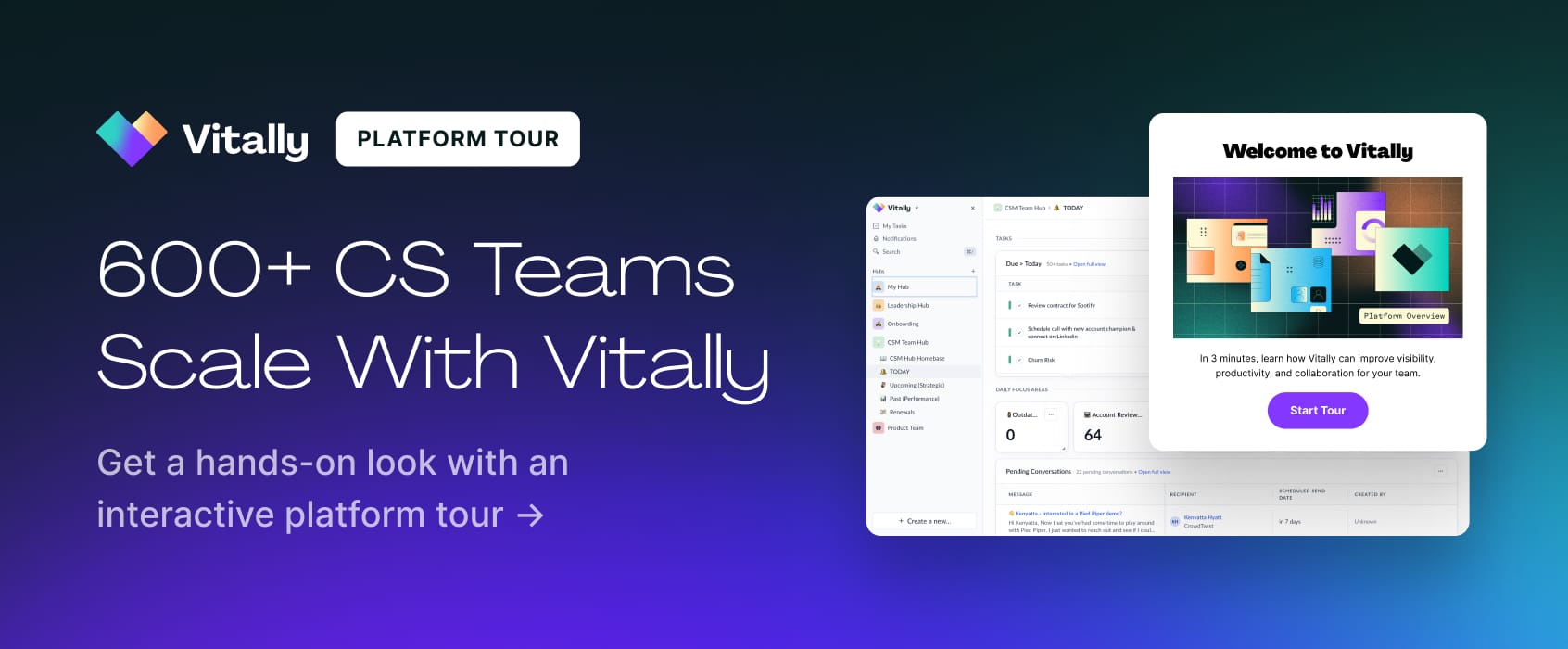
Software as a Service (SaaS) has revolutionized how digital products are distributed to customers. With the advent of cloud computing, it’s become faster and easier to service a larger number of customers at a lower cost. However, there can be tradeoffs in Customer Success that come with managing a more extensive client pool.
By necessity, managing a mass user base means that one-to-one or “high touch” customer engagements will be limited, and customer care will primarily be administered via automated digital tools.
The goal for a world-class SaaS company is to deliver stellar customer care at scale while ensuring it doesn’t feel templated and impersonal. How is this achieved in a one-to-many Customer Success model? Through the strategic use of “tech touch.”
In this article, we take a closer look at tech-touch Customer Success versus high-touch Customer Success and how to deploy both to get the best results.
What Is "Tech Touch" Customer Success?
When people refer to “old-fashioned customer service,” they’re basically regaling a time or a particular experience where a customer could expect personal attention during and after a purchase. In our digitized, fast-paced world, this is admittedly becoming a less common scenario.
To distinguish themselves from competitors, it’s not unusual for a startup or small SaaS company to rely on a high touch Customer Success model that prioritizes personalized care. The trouble starts when that company begins to experience growth. They soon realize that a high touch model is too expensive and time-consuming to be continued at scale. It also runs the risk of burning out Customer Success Managers as the ratio of paying customers to CSMs becomes too high.
Suddenly the company realizes why most of its competitors rely on low touch Customer Success. Enter tech touch.
Tech touch is simply low touch customer care with a digital twist. There is direct human interaction like high touch, but it’s less frequent, targeted, and intentional. Customer engagement is predominantly managed by automated software, and customer data like health scores are used to determine how and when a human should step in to provide a helping hand.
Unlike high touch Customer Success, tech touch is scalable, strategically proactive, and available at any point, day or night. If high touch CS is a brand asset, it can be effectively mimicked through AI-supported personalization up to the point that a customer needs to interact with a human member of the Customer Support team. This means less wear and tear on CSMs, and human high touch customer care can be directed where it generates the most impact.


How to Succeed With a Tech Touch Customer Success Model
To succeed with a tech touch Customer Success model, you’ll want to adhere to a few best practices. Knowing when it’s appropriate to implement tech touch is perhaps the most important tenet of its use. While tech touch CS undoubtedly offers many benefits, if applied to the wrong product, business, or customer type, it can be ineffective at best and disastrous at worst.
Know When Not To Use Tech Touch
An example of when tech touch would not be appropriate is if a SaaS company has a fairly complicated product or service that requires a lot of customer support for a client to use it. A recent poll shows that 81% of customers will attempt to solve their own customer service issues before reaching out for help. This works out perfectly if you have a low-tech or easy-to-use product. However, if your service is the opposite of that, you’ve just created a poor customer experience and a potential churn event.
Segment Your Customers
Another crucial aspect of ensuring tech touch works for your company is creating customer segments. With tech touch, it’s easy to take a one-size-fits-all approach to Customer Success, but the more targeted and intentional you can be with how you use it, the better your outcomes.
As pointed out above, there are simply some scenarios and customer types that require a hands-on approach, while others will thrive under a low touch model. Segmenting will allow you to see where using high touch over low touch will bring you the best ROI and customer lifetime value.
Track Customer Data
Besides its powerful automation features, tech touch also brings immense value to a SaaS company through data analytics. Literally, every touchpoint in a tech touch tree is a point where customer data can be gathered and tracked. Make full use of this capability to monitor customer health, improve products and services, and provide preemptive support to prevent customer churn.
Related: 5 of the Best Customer Success Platforms for SaaS Companies
Personalize Everything
Lastly, a SaaS company that prizes personal touch with customers might feel that tech touch has a tendency to be cold or impersonal. With a robust Customer Success Platform, you will be able to apply sophisticated personalization to every automated customer interaction, from emails and text messages to pushed content and virtual event engagement. Wherever you can, personalize everything.
Remember that low touch doesn’t mean low quality. When relying on tech touch CS, it’s essential to emphasize personalization where possible so that customers know they matter to your company and that they aren’t just another logo in your client database.
However, as your SaaS company grows, it doesn’t mean that you have to completely abandon high touch to save money and time. Instead, tech touch will empower you to apply hands-on support where it’s most needed and where it will bring your company the greatest return.
Master high touch and low touch Customer Success with Vitally’s world-class Customer Success platform. Request a free demo today to learn more.










